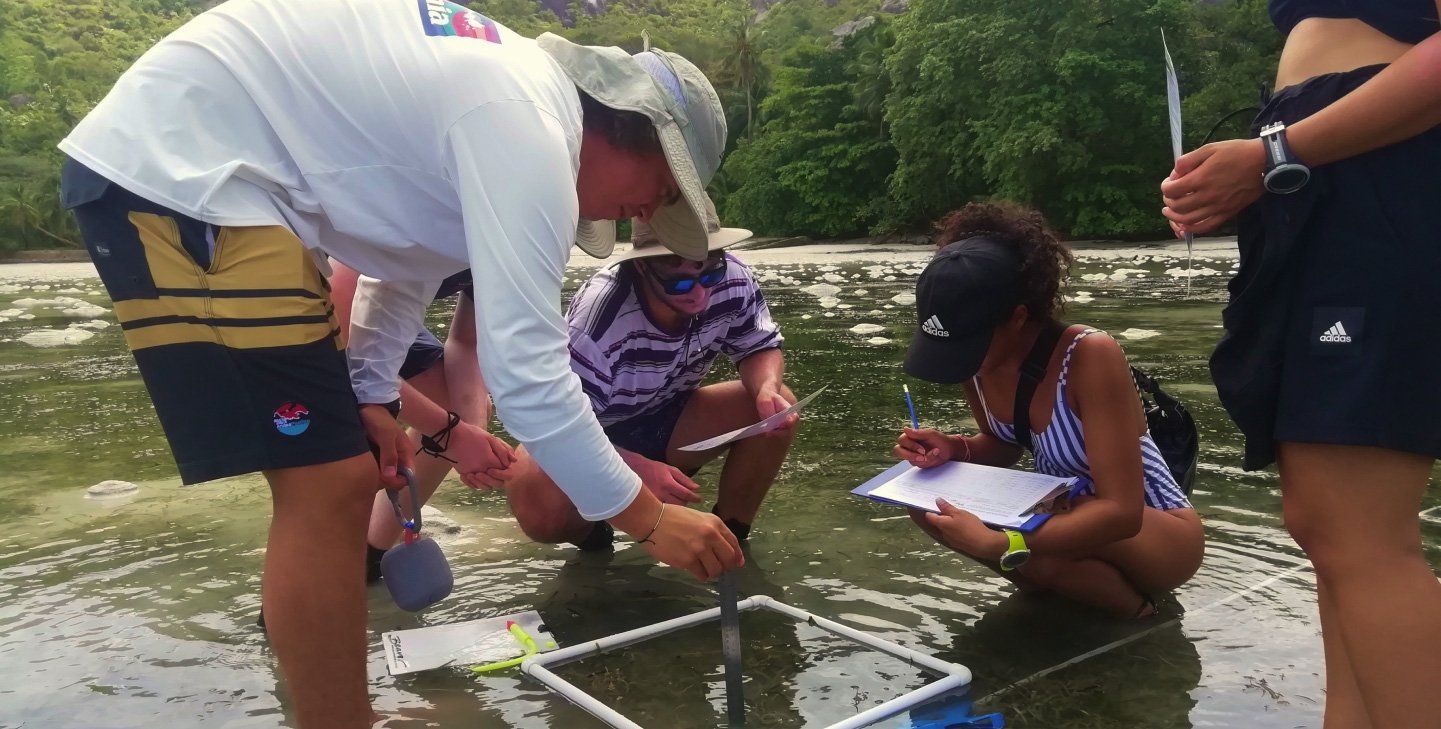

Citizen Science – Collaborate in Scientific Research
Work on cutting-edge citizen science research.
Our natural world is under threat. Ecosystems, habitats, plants and animals are all facing existential challenges – including us. We have to take action to save our home. Our citizen science programs have been specifically designed to meet this moment. If you’re passionate about conservation and sustainability, and looking for a sense of purpose and belonging, then there’s no better way than getting directly involved with studying and managing our most beautiful and valuable natural resources. Join this vital fight today.
What is citizen science?
If you are concerned about the environment and want to help make a difference, then you are the ideal citizen scientist.
Citizen science is the practice of public participation and collaboration in scientific research to increase knowledge about particular species, habitats or ecosystems.
You don’t need a science degree or conservation background. All you need is a keen interest and curiosity to learn and unlearn from nature, and a keen interest in assessing and recording the state of the world around us.
What does a citizen scientist do?
Participants who join us as a citizen scientist, will receive basic training on:
- species identification and orientation
- how to conduct field surveys
- how to collect data
- how to report findings.
Across our hubs, citizen science participants will be involved in observing nature with a critical lens, and collecting important data on various species such as birds, insects, reptiles, flowers and trees.
In addition, you will get an opportunity to:
- network and promote new ideas
- advance your understanding of conservation issues
- develop your leadership and program coordination skills.
The wildlife-monitoring programs, online databases, data visualisation, technology sharing, and other community efforts you are involved in as a citizen scientist are used by researchers, conservationists and partner institutes to understand the conservation issues in that particular ecosystem. It also plays a direct and vital role in how that region’s biodiversity is protected and maintained.
Highlights
- Develop hands-on conservation monitoring management skills
- Develop your observation and reporting skills
- Learn about plants, ecosystems, habitats and animals
- Learn survey techniques
- Contribute to United Nations Sustainable Development Goal #13 Climate Action and #14 Life Below Water
Filter programs








Citizen science – be part of on-the-ground research
As a citizen scientist, you’ll be working on location as part of a research team. You will work directly with local communities and on-the-ground research teams, gathering data and developing research aimed at finding sustainable, impactful solutions to real-world conservation questions.
Citizen science – develop your research skills
Working alongside researchers and like-minded people across the globe will give you a chance to understand the broader relevance of data collection processes, data visualisation, and project design, facilitation and research. All while immersing yourself in a new culture and making a tangible impact towards conserving the natural world.
Citizen science – make a meaningful impact
Our citizen science programs contribute directly to United Nations Sustainable Development Goals (SDG) #4 Quality Education, #13 Climate Action, #15 Life on Land and #17 Partnerships for Goals. Citizen science provides a novel solution to complement and enhance official statistics, while at the same time potentially mobilising action and raising awareness for achievement of the SDGs. Citizen science also has much to offer to other international agreements and frameworks, such as the Convention on Biological Diversity’s Post-2020 Global Biodiversity Framework, Paris Agreement, Aarhus Convention, Sendai Framework for Disaster Risk Reduction, New Urban Agenda, among others.
Citizen science – improve your mental health and well-being
Volunteering in nature based citizen science projects has been proven to boost the well-being of participants and can have several mental health benefits, like:
- A sense of purpose: Having a common, dedicated mission like making an active and valuable contribution to society by advancing scientific knowledge can boost your self-esteem and provide a sense of belonging.
- Connection with nature: Spending time in nature is both inspiring and tranquil, awesome and exciting. It will improve your mood and reduce your stress level.
- Mindfulness: Citizen science programs can help shift your attention away from everyday stress and achieve a state of mindful engagement, which can reduce anxiety, improve concentration, and provide a break from the pressures of daily life.
- Community: Joining a community of like-minded individuals who share a common interest in science and nature can reduce feelings of isolation, enhance social connections and promote a sense of belonging.
- Physical activity: Some citizen science projects involve physical activities, such as fieldwork, hiking or diving. Engaging in regular physical activity has numerous mental health benefits, including improved mood, reduced anxiety and increased self-esteem.
It’s important to note that while citizen science projects do have positive mental health impacts, they are not a substitute for professional mental health support. If you or someone you know is experiencing mental health difficulties, please seek appropriate professional help from your local health authorities.
You can volunteer as a citizen scientist across three continents in terrains ranging from tropical rainforest to ocean ecosystems.
Citizen science in Chiang Mai, Thailand
Travel to the remote northern province of Thailand’s Chiang Mai province, where you will catalogue endemic and migratory bird species.
Citizen science in Costa Rica
Our Costa Rica citizen science program gives you a chance to document the amazing biodiversity in the dense rainforest and spectacular coral reef system that our research teams have exclusive access to in Cahuita National Park. Plants, insects, mammals, birds, reptiles and marine species – you will get to work with some of the rarests animals on the planet!
Citizen science in Tenerife, Canary Islands
Dive into the sparkling blue waters of the Canary Islands, where our conservation efforts are focused monitoring whale and dolphin species. You’ll also be involved in ongoing research around the problem of marine debris – and how to clean up our oceans.
Our citizen science programs include a range of focus areas:
Citizen science and marine pollution
Plastic leakage into marine ecosystems has grown sharply in the last decade, and is projected to double by 2030, with dire consequences for human health, biodiversity and climate.
Plastic is an unfortunate but indispensable reality for communities that live along coastlines the world over. While necessary for economic activity, plastic marine debris and the associated pollution has become a massive ecological disaster, adversely affecting communities living in – and depending on – coastal ecosystems.
Our mission in these communities is to:
- Clear beaches and surrounding waters of pollution.
- Gather meaningful data on marine debris using citizen science programs such as Dive Against Debris, or the marine debris program of National Oceanic & Atmospheric Administration (NOAA).
- Support the United Nations Environment Program #cleanseas campaign.
- Strive to reduce plastic use by finding alternative sustainable solutions.
Citizen science programs for bird lovers
If you’re an avid bird-lover looking to get involved in bird conservation. Or if you’re keen to study those rare bird species only found in tropical forests, then this is the citizen science program for you.
Our locations are home to more than 2,000 species of birds, and tracking the health of these birds is an immense but essential challenge. That’s where you come in. As a citizen scientist on this program, you will spend your time in the forests around our hubs, collecting data and periodically uploading your findings to the citizen science e-bird platform. Monitoring these species in their habitats is an essential part of their protection and conserving the unique biodiversity necessary to ensure the survival of these beautiful birds.
Citizen science program for naturalists
If you’re someone who is fascinated by birds, bees, insects, mammals, reptiles and every element of nature, then this program is for you.
As a naturalist, you will be spending most of your time observing nature around you and recording it. Using the iNaturalist platform, you will take photos and record audio clips of everything from frogs, insects, moths and birds, while closely observing the relationships between these animals and their environments, and how the relationships change over time.
I am new to citizen science. How does it work?
If you love to spend your time outdoors, exploring nature, and learning all about the weird and wonderful life you find, then you’re a citizen scientist. On our citizen science programs, you will:
- catalogue and analyse your observations
- learn more about wildlife by participating in daily species identification sessions
- submit your observations to global research databases
- share your observations and findings on social media.
What citizen science databases will I contribute to?
You will contribute all your data on plants, insects, mammals and reptiles to iNaturalist – a multimedia scientific archive for research, education and conservation.
Do I have to be a qualified scientist or have a degree to participate?
No prior training or experience is required. This program is designed for anyone who has passion or interest in their natural environment.
Will scientists and conservationists really use this data?
Yes! You will be contributing to a vast, vital global database that allows scientists to track changes in species, habitat and ecosystems. This data is being actively used to answer some of our most important scientific questions and the research you contribute to is often published in highly reputable journals.
Filter programs














